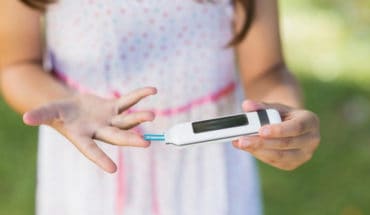DETECT AF at vaccine centres: Success of Arrhythmia Alliance Detection of AF at COVID-19 vaccination centres scheme shows value of using every opportunity to DETECT AF in people aged 65 or older.
A scheme by Arrhythmia Alliance to DETECT atrial fibrillation (AF) — the most common type of arrhythmia (heart rhythm disorder) and a major cause of stroke — found that 6% of people aged 65 or older attending a COVID-19 vaccination centre had an irregular rhythm aka “possible AF”.1 This result supports previous findings that the incidence of AF is higher among people aged 65 or older than it is in the general population and that a simple pulse check can identify previously undetected AF.2,3
The detection of AF is vital because without appropriate therapies, a person with AF may be five times more likely to have a stroke than someone without AF. AF-related strokes are more often fatal and more disabling than strokes from other causes. Unfortunately, AF is often asymptomatic (without symptoms) and many people with AF (thought to be about half a million in the UK) do not realise that they have AF. In fact, some people do not discover that they have AF until they have an AF-related stroke.
However, an irregular pulse can be a sign of AF and can be easily identified with a simple pulse check. For this reason, Arrhythmia Alliance, and its sister charity AF Association, run the “Know Your Pulse” campaign to “DETECT AF with a Simple Pulse Check” — providing information and support on the importance of knowing your pulse and how to take your pulse (manually or with digital tools). Furthermore, the AF Association AF White Paper — Put People First states that any contact — both in a healthcare setting or non-healthcare setting — with a person aged 65 or older is an opportunity to DETECT AF.3
Unfortunately, the COVID-19 pandemic has meant that many opportunities to DETECT AF (both in healthcare and non-healthcare settings) have been lost. Clinics have moved online, and people have generally avoided visiting their GP, for fear of contracting/spreading COVID-19, meaning opportunistically checking someone’s pulse during a medical appointment has not been possible. Potentially, this means the number of people with undiagnosed AF could increase and, consequently, the number of AF-related strokes could also increase.
To address this challenge, Arrhythmia Alliance, supported by its sister charity AF Association, launched an opportunistic screening programme to DETECT AF in people aged 65 or older attending a COVID-19 vaccination clinic. Importantly, Arrhythmia Alliance wrote a protocol that outlined how to perform a pulse check in a COVID-19 safe manner (such as using a single-lead mobile ECG, which could be sanitised between uses, rather than manually taking someone’s pulse) and in a way that did not delay the vaccination process.
In the pilot scheme, at a GP surgery in Suffolk, 317 people were screened using a single-lead mobile ECG in one day. Of these, 26 were found to have possible AF with the majority (20) having not been previously diagnosed with the condition. A subsequent screening, at a medical centre in London, found that 7 of 160 people screened (in one day) had possible AF. Overall, this means that 6% (27) of all those screened (477) had previously undetected possible AF.
Following the success of these trials, Arrhythmia Alliance created an online resource hub for healthcare professionals working at vaccine clinics to use to DETECT AF. This included Know Your Pulse posters, referral letters, and What is AF factsheets — all of which could be downloaded and printed off free of charge. Additionally, the charity provided links to “Know Your Pulse” videos (which explained how to perform a simple pulse check and how this can help to DETECT AF) that could be played at vaccine centres. The charity hopes that healthcare professionals will continue to use these resources to DETECT AF, as specified by the AF White Paper, during any contact with a person aged 65 or older not just at COVID-19 vaccine clinics. For example, a routine check-up, at a seasonal flu vaccination clinic, or a COVID-19 booster shot.
Trudie Lobban MBE, Founder & CEO of Arrhythmia Alliance, says seizing the opportunity to promote the “Know Your Pulse to Know Your Heart Rhythm — it Could Save Your Life” campaign at COVID-19 vaccine centres “seemed the obvious thing to do”. She explains: “It did not delay or hinder the roll out of the vitally important vaccine and, yet at the same time, we may have potentially saved someone from a fatal AF-related stroke. The success of the scheme has shown how a simple pulse check can easily be performed in any setting, healthcare, or non-healthcare, and is a great way to identify people who may have AF. Going forward, as restrictions lift, we encourage all healthcare professionals to explore ways that they can opportunistically DETECT AF and ensure their patients understand the importance of knowing their pulse,” Lobban adds.
For more information, visit: www.heartrhythmalliance.org/aa/uk/detection-of-af-at-vaccination-centresectAFVaccines
- Gut microbiome could delay onset of type 1 diabetes - 3rd April 2025
- The da Vinci 5 Robot Is Set To Transform Bariatric Care: - 31st March 2025
- Beyond money: the hidden drivers fuelling child food insecurity - 31st March 2025






